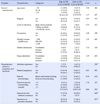Abstract
Methods
The research was quasi-experimental with a non-equivalent control group non-synchronized design. Participants were first-time mothers admitted to two postpartum clinics at women's hospitals. The experimental group had 38 mothers and the control group had 35 mothers. A maternal role adjustment program was applied individually to the experimental group between the 1st and 2nd weeks after childbirth. Assessing Adaptation to Motherhood, Semantic Differential Scale-Myself as Mother, and Edinburgh Postnatal Depression Scale were used to measure effects of the program. A pre-test was conducted in the 1st week after childbirth while post-tests were conducted in the 4th and 6th weeks. Data were analyzed with χ2 test, Fisher's exact test, t-test, and repeated measures ANOVA using SPSS 24.0.
Results
Maternal role adjustment (F=6.17, p=.015) and maternal identity (F=6.63, p=.012) were significantly increased in the experimental group compared to those in the control group. However, the difference in postpartum depression (F=1.11, p=.335) was not statistically significant between the two groups.
Figures and Tables
Notes
Summary Statement
▪ What is already known about this topic?
Achieving maternal attachment and maternal identity and developing a sense of well-being are regarded as critical components of maternal adjustment for first-time mothers.
▪ What this paper adds?
The maternal role adjustment program is effective for enhancing maternal role adjustment and maternal identity of first-time mothers.
▪ Implications for practice, education and/or policy
The maternal role adjustment program provided at postpartum clinics of women's hospitals is a nursing intervention that can enhance maternal role adjustment and maternal identity of first-time mothers.
References
1. Mercer RT. Becoming a mother versus maternal role attainment. J Nurs Scholarsh. 2004; 36(3):226–232.

2. Rubin R. Attainment of the maternal role: Part I. processes. Nurs Res. 1967; 16(3):237–245.
5. Mercer RT. The process of maternal role attainment over the first year. Nurs Res. 1985; 34(4):198–204.

6. Pridham KF, Lytton D, Chang AS, Rutledge D. Early postpartum transition: Progress in maternal identity and role attainment. Res Nurs Health. 1991; 14(1):21–31.

7. Chae YS. Adaptation of maternal roles and postpartum depression of primiparas during early postpartum period [master's thesis]. Seoul: Ewha Womans University;2005. 68.
8. Mercer RT, Walker LO. A review of nursing interventions to foster becoming a mother. J Obstet Gynecol Neonatal Nurs. 2006; 35(5):568–582. DOI: 10.1111/j.1552-6909.2006.00080.x.

9. Chae MY, Hwang MS. The effects of home care nursing based maternal role strengthening programs on the maternal identity and confidence of maternal role on first-time mothers. J Korean Acad Soc Home Care Nurs. 2011; 18(2):88–98.
10. Yoo DS. The postpartum depression and maternal role adjustment of mothers having an infant [master's thesis]. Seoul: Seoul National University;2008. 55.
11. Kim JY. Psycho-social predicting factors model of postpartum depression [master's thesis]. Seoul: Sungshin Women's University;2003. 49.
12. Park KY, Lee SO. A comparative study on the predictors of depression between primipara and multipara at postpartum 6 weeks. J Korean Soc Matern Child Health. 2011; 15(1):25–36.
13. Ozkan H, Polat S. Maternal identity development education on maternity role attainment and my baby perception of primiparas. Asian Nurs Res (Korean Soc Nurs Sci). 2011; 5(2):108–117. DOI: 10.1016/S1976-1317(11)60019-4.
14. Jang YS. Effects of a maternal role promotion program for mothers of premature infants on maternal role strain, maternal role confidence and maternal identity. Korean J Child Health Nurs. 2005; 11(4):472–480.
15. Kordi M, Fasanghari M, Asgharipour N, Esmaily H. The effect of maternal role training program on role attainment and maternal role satisfaction in nulliparous women with unplanned pregnancy. J Educ Health Promot. 2017; 6:61. DOI: 10.4103/jehp.jehp_113_15.
16. Srisomboon A, Serisathien Y, Yusamran C, Phahuwatanakorn W. The effect of a maternal role promoting program on maternal role attainment in adolescent mothers with unplanned pregnancies. J Nurs Sci. 2011; 29(2):74–81.
17. Kim YS, Lee YJ, Park GH. The effects of maternal health care program on depression, maternal role self-confidence and delivery self-efficacy in pregnant women. J East West Nurs Res. 2017; 23(2):134–141. DOI: 10.14370/jewnr.2017.23.2.134.
18. Bang KS, Huh BY, Kwon MK. The effect of a postpartum nursing intervention program for immigrant mothers. Child Health Nurs Res. 2014; 20(1):11–19. DOI: 10.4094/chnr.2014.20.1.11.

19. Gao LL, Xie W, Yang X, Chan SW. Effects of an interpersonal-psychotherapy-oriented postnatal programme for Chinese first-time mothers: A randomized controlled trial. Int J Nurs Stud. 2015; 52(1):22–29. DOI: 10.1016/j.ijnurstu.2014.06.006.

20. Kim MY, Kim WO, Han SS. Effects of individual and group education programs on coping and self-care behaviors in cancer patients. J East West Nurs Res. 2014; 20(1):1–8. DOI: 10.14370/jewnr.2014.20.1.1.

21. Jang YS. Effects of a workbook program on the perceived stress level, maternal role confidence and breast feeding practice of mothers of premature infants. J Korean Acad Nurs. 2005; 35(2):419–427.

23. Walker LO. Investigating the semantic properties of two concepts. Unpublished manuscript paper. Austin, Texas: The University of Texas at Austin;1977.
24. Kim AR, Tak YR. Maternal role development in neonatal intensive care unit graduate mothers of premature infant. Korean J Women Health Nurs. 2015; 21(4):308–320. DOI: 10.4069/kjwhn.2015.21.4.308.

25. Cox JL, Holden JM, Sagovsky R. Detection of postnatal depression: Development of the 10-item Edinburgh Postnatal Depression Scale. Br J Psychiatry. 1987; 150:782–786.
26. Yeo JH. Postpartum depression and its predictors at six months postpartum. Korean J Women Health Nurs. 2006; 12(4):355–362.

27. Sim KS, Kho HJ, Lim KH. A study on the educational needs of the mothers for the infant care. J Korean Soc Matern Child Health. 2002; 6(2):287–297.
28. Song JE, Ahn JA. Effect of intervention programs for improving maternal adaptation in Korea: Systematic review. Korean J Women Health Nurs. 2013; 19(3):129–141. DOI: 10.4069/kjwhn.2013.19.3.129.

29. Song JE, Ko JM. Influencing factors on maternal role adjustment among the primipara women in the first year after child-birth. J Korean Soc Matern Child Health. 2016; 20(3):284–296.
30. Walker J, Payne S, Jarrett N, Ley T.
KJ Lee
S Kim
S Yang
KH Lee
SB Im
. Psychology for nurses and the caring professions. 4th ed. Seoul: Soomoonsa;2013. p. 161–178.




 PDF
PDF ePub
ePub Citation
Citation Print
Print







 XML Download
XML Download